Recommended Itineraries
Tokyo's New Luxury, found in Tama and the islands of Tokyo
Courses for Enjoying the Charms of Nature Parks


One-day Island TripMiyakejima
A Trip Around Miyakejima:
Encounter the Bare Land and Feel the Earth’s Pulse
Miyakejima offers a remarkable variety of geo-spots in a small and concentrated area.
Travel the 30-kilometer public road that circles the island as you view the
workings of nature that have shaped the terrain.
Even those not interested in geology can enjoy this course that lets you feel the living and breathing Earth.
To explore this theme further, we recommend a guided tour.
Contact the Miyakejima Tourist Association to arrange for your own guide.
The course below is a three-hour tour that
starts from the Ako Fishing Port Waiting Area at 9:00 a.m.
Advanced inquiry is required.
Ako Fishing Port Waiting Area
Ako Fishing Port Waiting Area
Ako Fishing Port (Sabigahama Port) is one of the three ports on Miyakejima. Its waiting area is home to the Miyakejima Tourist Association and offers various services for sightseeing, including electric bicycle rentals. You will get around by car. The first thing that enters your sights is the lava flow trail (Imasaki Coast). It’s an amazing sight with lava flowing into the ocean.
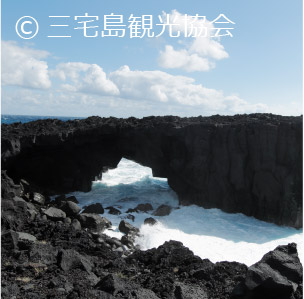
Izu-misaki Lighthouse
Izu-misaki is one of Miyakejima’s most scenic spots and is also known as a geo-spot. The exposed layers let you trace the island’s 10,000-year volcanic history.
The upper
side of the road has strata that date back more than 2500 years. Volcanic ash from Niijima, which erupted in 886 CE, can also be discovered in the strata.
Floating far across the ocean is Niijima, whose mere presence instills fear of its incalculable eruptive force.
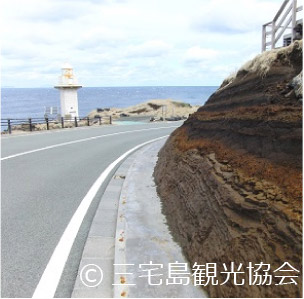
Shiitori Shrine
This shrine has come to symbolize Miyakejima’s recovery.
The white, dead trees sticking out of a lush green forest and the massive mountain in the background makes for an
unusual scene. As they gaze at the thick green trees, the islanders often murmur to themselves in awe of how much progress the island has made in its regeneration.
This once
thriving forest was instantly turned into a wasteland by the huge amounts of volcanic gas generated by the eruption in 2000. About twenty years later, the innocent yet fierce
vitality of the new forest that has sprung up from under the dead trees is striking.
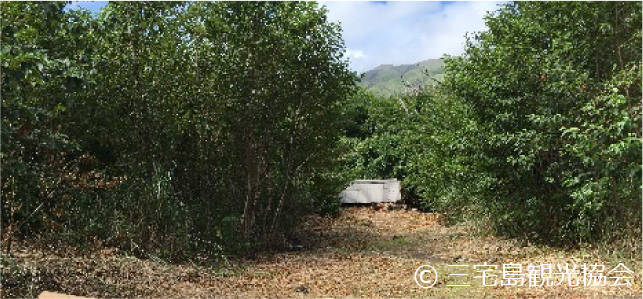
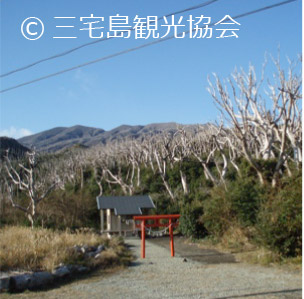
Nippana Shinzan
Nippana Shinzan is a mountain cliff that appeared overnight after a seabed explosion following the Miyakejima volcano eruption in 1983. It has been cut into a semicircle by
erosion from waves and given its current shape with its exposed strata.
The rock layers give clues to the mechanism behind volcanic eruptions.
The vast black space
created by the scoria* have made it a world distinct from the earth’s landscape. It almost feels like a different planet.
*Scoria: ejections of lava. Lava pulverized
by phreatic explosion (a steam-blast eruption of magma).
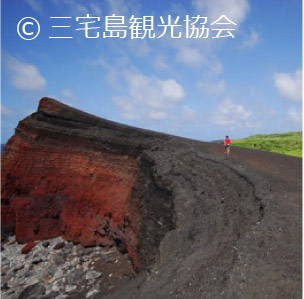
Toga Beach
The village road leading to Toga Beach has no utility poles, guardrails, or other artificial fixtures. It’s a single road that winds its way to the plateau along the shoreline. It’s untouched nature between the ocean and the mountains. The simple yet magnificent scenery will make you feel tiny.The road’s endpoint is Toga Beach. Look back along the promenade leading to the coast and you’ll see cliffs with strata exposed through ocean erosion.
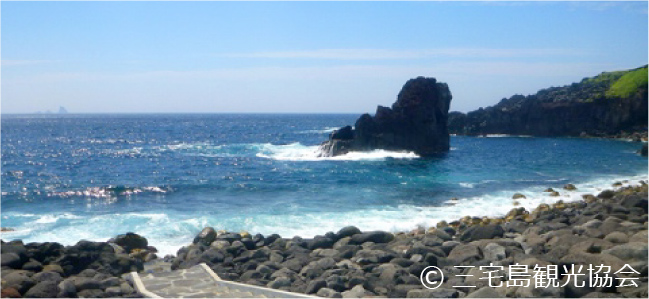
Feel the Breath of the Earth!
See How Vegetation Developed into a Climax Community
Do you know the term climax community?
It refers to a phenomenon in which plants and animals are in a steady state and will no longer “transition,” or evolve.
Miyakejima is a very active volcanic island. It
has erupted many times throughout its history.
There are young lava flows, flows a hundred years old, forests which have remained untouched by volcanic activity for
thousands of years. By tracing the eruptions over eras of history, we can learn about how the vegetation has changed.
The theme of this three-hour journey is the
transition into a climax community. It’s an experience only possible here on Miyakejima.
To explore this course, we recommend you use a guided tour.
Guides can be referred to you by the Miyakejima Tourist Association.
The course below is a three-hour tour that
starts from the Ako Fishing Port Waiting Area at 9:00 a.m.
Advanced inquiry is required.
Ako Fishing Port Waiting Area
Ako Fishing Port Waiting Area
Ako Fishing Port (Sabigahama Port) is one of the three ports on Miyakejima.
Its waiting area is home to the Miyakejima Tourist Association and offers various services for sightseeing, including electric bicycle rentals.
You will get around by
car.
The first thing that enters your sights is the lava flow trail (Imasaki Coast). It’s an amazing sight with lava flowing into the ocean.
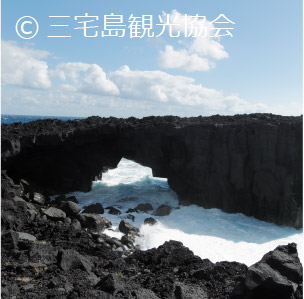
Ako Lava Flow Trail
This is the lava flow from 1983, which is the most recent flow. This is one of the few places in Japan where you can walk above the flow.
The force of the lava flow that
appears as if to swallow the elementary school is amazing. You will be immersed in the experience.
The rough and bare surface of lava shows the beginnings of
vegetation. Even in this harsh environment, you can clearly sense signs of life in some places.
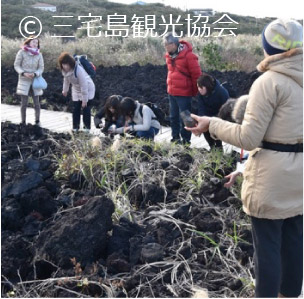
Shichito Observatory
In the coastal regions with strong winds, sources of nutrients do not accumulate in the lava flow, making it difficult for vegetation to take root. As you come to the
mountainside, the effects of the salty sea air start to fade and water supply improves, creating a better environment for plants to grow. This makes it clear that plants can
transition at different speeds even within the same lava flow.
The field of pampas grass near the Shichito Observatory offers a superb golden delight for the eyes. (The golden scenery is best seen on an autumn afternoon in soft sunlight.)
We
recommend taking the Tsubota Forest Road on your way back from the Shichito Observatory. This allows you to sense the changes in plant life as you descend from the pampas grass
field.
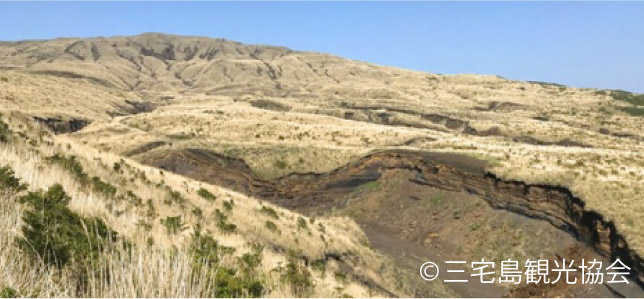
Tairo-ike Lake Observatory
This is a viewing platform above Tairo-ike Lake. The elevated wooden deck juts out diagonally, offering a picturesque view of the virgin forest and Tairo-ike Lake below.
A
world of green that almost appears to float out from the reddish-brown landscape makes you feel at ease. Breathe in deeply to feel the negative ions drifting on the ascending
current. Inhale the power of the Earth and invigorate your body.
As you approach the bottom, the area gradually becomes covered in thick trees. An atmosphere filled
with moisture and vitality makes you wonder if you are still on Miyakejima. Seeing the contrast in the plant life from the desolate mountainside is one of the real pleasures of
visiting this island.
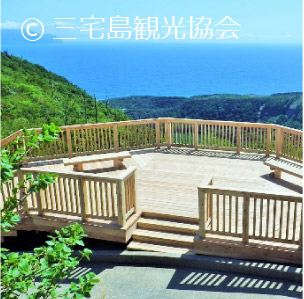
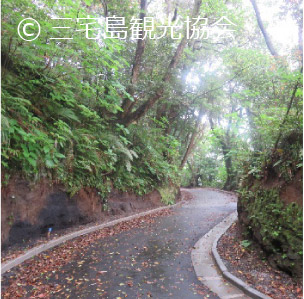
Tairo-ike Lake
Tairo-ike Lake is a crater lake formed 2,500 years ago in a phreatic explosion. The land that was bare and desolate right after the explosion gradually transitioned into an
ecosystem over time. This came to be known as a climax community.
If you decide to visit this location, be sure to take a stroll along the 2-kilometer promenade that circles
the pond. You’ll hear bird calls from all over the forest, which is known as an excellent spot for birdwatching. The forest is truly alive. It’s a place where you can relax and
forget about the flow of time.
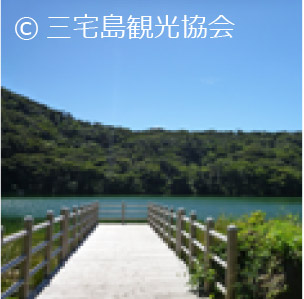
Support/Contact
- Miyakejima Tourist Association
- Tel: 04994-5-1144
- Hours: 8:30 a.m. to 5:00 p.m.
- https://www.miyakejima.gr.jp/
“Leave it to Me” Expert Nature Guide
Let a private guide show you the right spots for the season or come up with a plan according to your requests. Experience the wonders of Miyakejima at your own pace as you travel to places recommended by a local guide perfect for the time you’re travelling.

Note: The Tokyo islands are a small remote community, and very few residents speak any language other than Japanese.
For a smooth experience, we recommend that you
travel with somebody who is able to communicate in Japanese.
